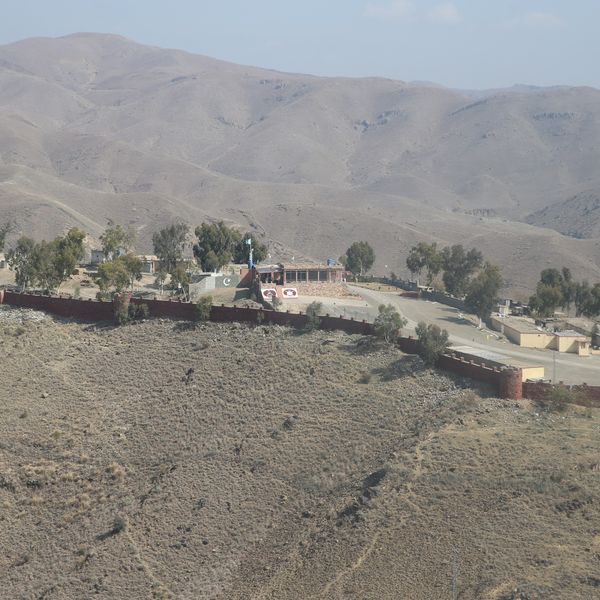No decision yet on Imran’s military trial, Pakistan govt tells court
Govt representative says law allows for civilians to be tried in military courts under ‘certain conditions’

Aamir Abbasi
Editor, Islamabad
Aamir; a journalist with 15 years of experience, working in Newspaper, TV and Digital Media. Worked in Field, covered Big Legal Constitutional and Political Events in Pakistan since 2009 with Pakistan’s Top Media Organizations. Graduate of Quaid I Azam University Islamabad.

IHC is hearing petition from former prime minister to prevent a potential military trial following ex-spy chief's arrest
Justice Miangul calls for government to clarify whether Imran Khan could face a military trial
The Pakistani government has informed the Islamabad High Court (IHC) that no decision had yet been made regarding the potential military trial of incarcerated Pakistan Tehreek-e-Insaf (PTI) founder and former prime minister Imran Khan.
During a hearing this week, Brigadier Falak Naz, representing the Ministry of Defense, stated that while no firm conclusion has been reached, the law allows for civilians to be tried in military courts under “certain conditions”.
The court is hearing a petition filed by Imran Khan to prevent his possible military trial.
The former prime minister’s legal team has expressed concerns in the petition over the government’s intentions, following comments from Defense Minister Khawaja Asif, who implied that former ISI chief Lt. Gen. (retd) Faiz Hameed, who is considered close to Imran Khan, acted as a “strategic adviser” to the PTI during riots on May 9, 2023.
On that day, PTI supporters allegedly attacked and vandalized government and military installations following Imran Khan’s brief arrest in a corruption case. The violence led to the detention of hundreds of PTI leaders and supporters.
Last month, the army arrested Hameed, accusing him of multiple violations of the Pakistan Army Act. His close association with Imran Khan during his premiership from 2018 to 2022, and alleged role in the May riots, sparked speculation that the former premier could also face military proceedings.

During the court session, Justice Miangul Hassan Aurangzeb questioned the procedures that would allow civilians to be tried under military jurisdiction.
Brigadier Naz explained that under Section 2(1)(d) of the Pakistan Army Act, civilians could be subject to military trials if they are accused of offenses deemed related to the military. He added that any such move must be reported to a magistrate.
Imran Khan’s lawyer challenged the legality of his client’s treatment in custody, including alleged midnight hearings without due notice. The defense emphasized that any trial or detention of Imran Khan in a military court would be unconstitutional without proper legal procedures.
The additional attorney general reiterated that the government had not yet received any formal request to place Imran Khan under military trial. The IHC noted that the petition may be premature but requested that the government clarify its position by the next hearing, set for September 23.
Justice Aurangzeb warned that any sudden action without due process would be unacceptable. The court adjourned, awaiting a formal response from the Ministry of Defense.
The case
The case stems from a petition filed by Khan earlier this month, days after the arrest of former spymaster Lt. Gen. Faiz Hameed. The ex-general, believed to have close ties with Khan, is facing court-martial proceedings. Khan’s lawyers expressed fear that the ex-premier might face a similar fate.
Khan's legal team argued that transferring him to military custody would violate his fundamental rights and undermine the rule of law.
The petition expressed concern over statements by senior military and government officials suggesting the possibility of a military trial for the Pakistan Tehreek-e-Insaf (PTI) founder.
It also challenges the legality of any potential trial by court-martial, citing a Supreme Court ruling that declared the trial of civilians in military courts unconstitutional.
At the last hearing, on September 12, the IHC directed Pakistan's government to clarify its position on the potential military trial of Imran Khan by September 16.
Justice Mian Gul Hassan Aurangzeb, presiding over the hearing, questioned whether the government intended to pursue a military trial for Khan. "If no such proceedings are underway, the petition will become moot. If there is a possibility, we will proceed with the case," the judge observed.
Imran Khan’s lawyer, Aziz Bhundari, argued that the government’s rhetoric had created uncertainty around Khan’s potential military trial. However, Justice Aurangzeb remarked, “This is politics. You’re saying no case is in progress, but you fear one may be initiated?”
The judge further referenced a statement from the Director-General of Inter-Services Public Relations (DG ISPR), noting it as a “political” matter. Aurangzeb emphasized that Khan, as a civilian, should not be subjected to military trials, adding, “If we dismiss this case today, and tomorrow you return with a military trial order, what will happen then?”
The court ordered Additional Attorney General Munawar Iqbal Duggal to seek clear instructions from the government regarding its stance on Khan’s trial and report back to the court by the deadline.
'Political environment to worsen'
Journalist and political analyst Amir Zia believes the political situation would worsen if Imran is court-martialed. He earlier told Nukta that the head of a popular political party should not face a military trial. “Ideally, no one should, but especially not the leader of a popular party,” he said.
Zia said the political environment was already polarized, the political scene will only worsen if this happens.
“When politicians are tried in military courts instead of civilian ones, it raises questions about the credibility of institutions and makes them more controversial,” he concluded.
'Military intervention'
Political parties and critics have for long accused Pakistan's army of interfering in politics and governance.
The ex-premier also blames the military for his 2022 ouster and 12-month-old imprisonment on what he calls trumped-up charges. He has been accused of dozens of charges ranging from corruption to leaking state secrets.
Last month, the country's spymaster from 2019 to 2020 Faiz Hameed - widely believed to be close to Imran - was taken into military custody, and will be court-martialed.
Hameed's arrest came after the military said it completed an inquiry ordered by the Supreme Court into a complaint by a real estate developer. It accused the former ISI chief of having misused his office to illegally occupy his housing scheme on the outskirts of Islamabad.
In addition, the military cited "multiple instances of violation of the Pakistan Army Act" following Hameed's retirement that it said had also been established against him.
In an informal conversation with the media inside Adiala jail, following an in-prison hearing of one of his cases, Imran mentioned the likelihood of being taken to a military court after Hameed is made an approver against him.
The PTI founder said everyone knows that all other cases against him have ended, so now they want to take him to military courts, for which they will get a statement from Faiz that May 9 was a conspiracy.











Comments
See what people are discussing